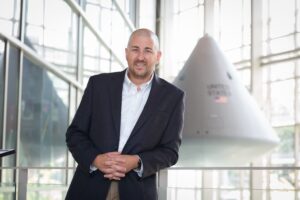Laser-Induced Spark Ignition in Rocket Engines
Speaker: Dr. Carson Slabaugh - Purdue University, West Lafayette, Indiana
Date: Mar 1, 2024; Time: 2:30 PM Location: PWEB 175
 Abstract: The 9-month journey home from Mars could begin with a 9 ns laser pulse. Ignition in rocket combustors is typically accomplished using a spark plug, a pyrotechnic charge, an injection of hypergolic fluid, or a hot gas torch. These methods involve significant mechanical complexity, increase the inert mass with ancillary subsystems, limit the potential for engine re-ignitions throughout a mission, and require additional (often toxic) propellants. Non-resonant breakdown ignition is an alternative method in which the ignition energy is provided through a focused pulse of laser light. If the local flow conditions in the vicinity of the spark are suitable, a flame will develop and stabilize within the combustor. Laser-induced spark ignition holds significant promise for rocket combustion systems because the point of energy deposition can be precisely placed at an optimum location that minimizes the ignition energy requirement. This talk will focus on an experimental characterization ignition probability in a gaseous oxygen and gaseous methane combustor. The oxygen-centered shear co-axial injector generated a widely varying mixture field and velocity field to create significant variability in both the ignition process and outcome. Results from time-resolved imaging diagnostics will be discussed to explain the mechanisms that manifest the final ignition probability.
Abstract: The 9-month journey home from Mars could begin with a 9 ns laser pulse. Ignition in rocket combustors is typically accomplished using a spark plug, a pyrotechnic charge, an injection of hypergolic fluid, or a hot gas torch. These methods involve significant mechanical complexity, increase the inert mass with ancillary subsystems, limit the potential for engine re-ignitions throughout a mission, and require additional (often toxic) propellants. Non-resonant breakdown ignition is an alternative method in which the ignition energy is provided through a focused pulse of laser light. If the local flow conditions in the vicinity of the spark are suitable, a flame will develop and stabilize within the combustor. Laser-induced spark ignition holds significant promise for rocket combustion systems because the point of energy deposition can be precisely placed at an optimum location that minimizes the ignition energy requirement. This talk will focus on an experimental characterization ignition probability in a gaseous oxygen and gaseous methane combustor. The oxygen-centered shear co-axial injector generated a widely varying mixture field and velocity field to create significant variability in both the ignition process and outcome. Results from time-resolved imaging diagnostics will be discussed to explain the mechanisms that manifest the final ignition probability.
Biographical Sketch: Dr. Carson Slabaugh is the Paula Feuer Associate Professor in the School of Aeronautics and Astronautics at Purdue University. Since joining Purdue in 2015, he has developed an education and research program focused on propulsion. Dr. Slabaugh’s laboratory is housed within the Purdue Zucrow Laboratory complex, with high pressure, high flow-rate system capabilities to enable experimental replication of the flow and flame conditions (pressure, turbulence level, thermal power density) found in the most advanced propulsion and combustion systems. Ongoing research projects cover a wide range of topics: from the fundamental exploration of detonations and turbulent flames to the development of advanced combustion technologies for liquid rocket engines and rotating detonation engines. His group also maintains a continuous effort in the advancement of high-bandwidth (typically, laser-based) measurement techniques to non-intrusively probe the physics of these complex, reacting flows. Support for these research projects has been provided by AFOSR, AFRL, DARPA, DOE, NASA, ONR, and numerous industrial partners. Prof. Slabaugh has published extensively in the field and is involved with multiple national efforts to transition advanced concepts into aerospace propulsion technologies.